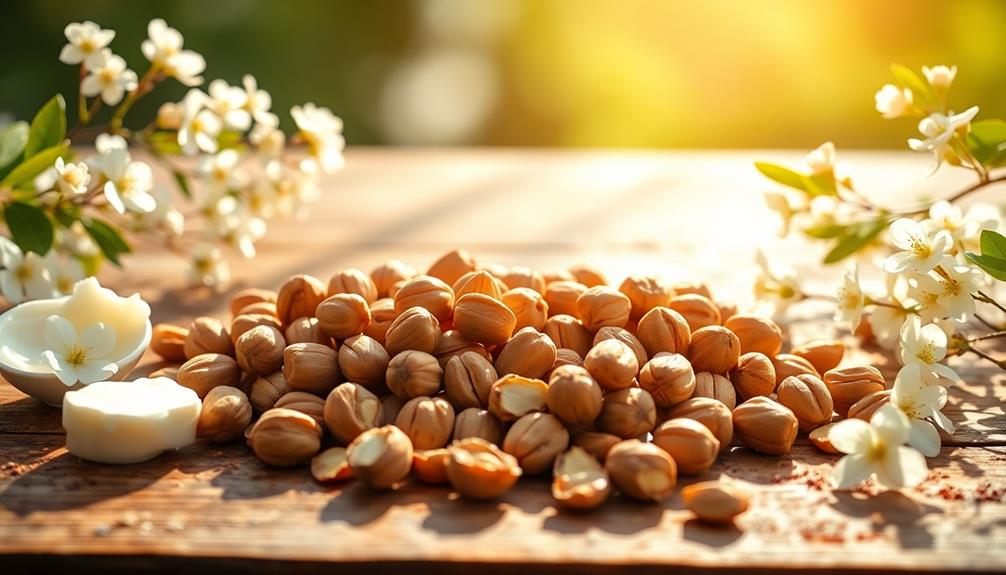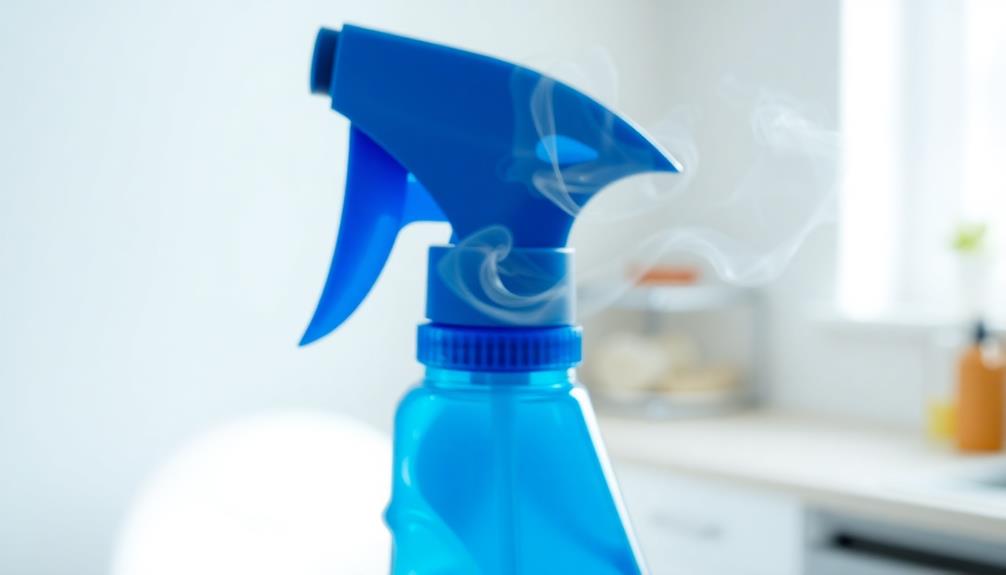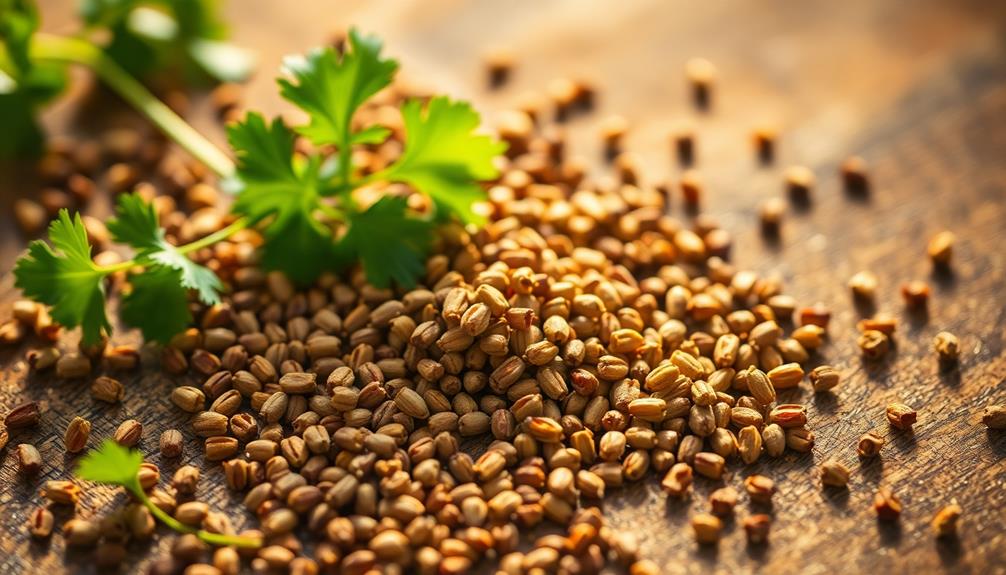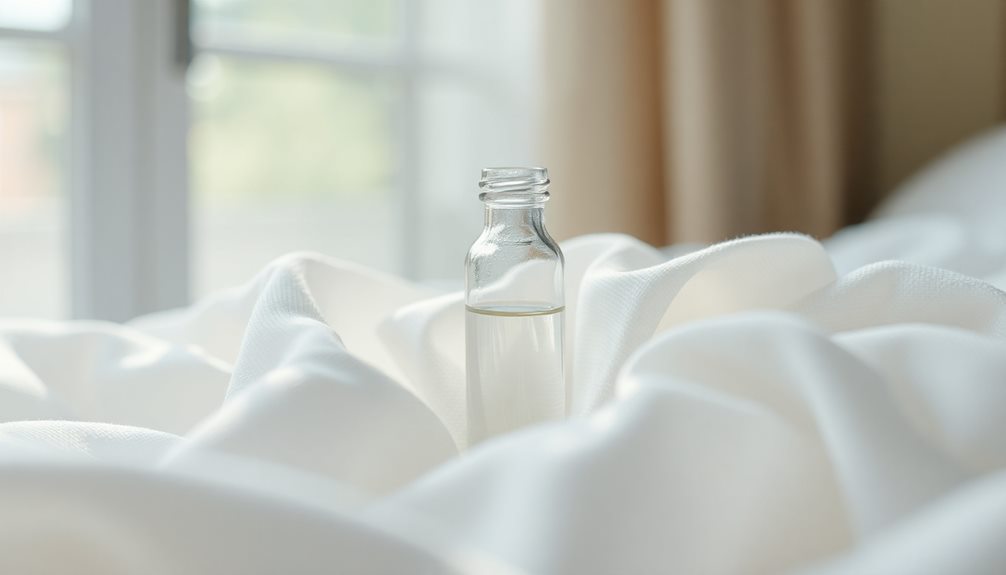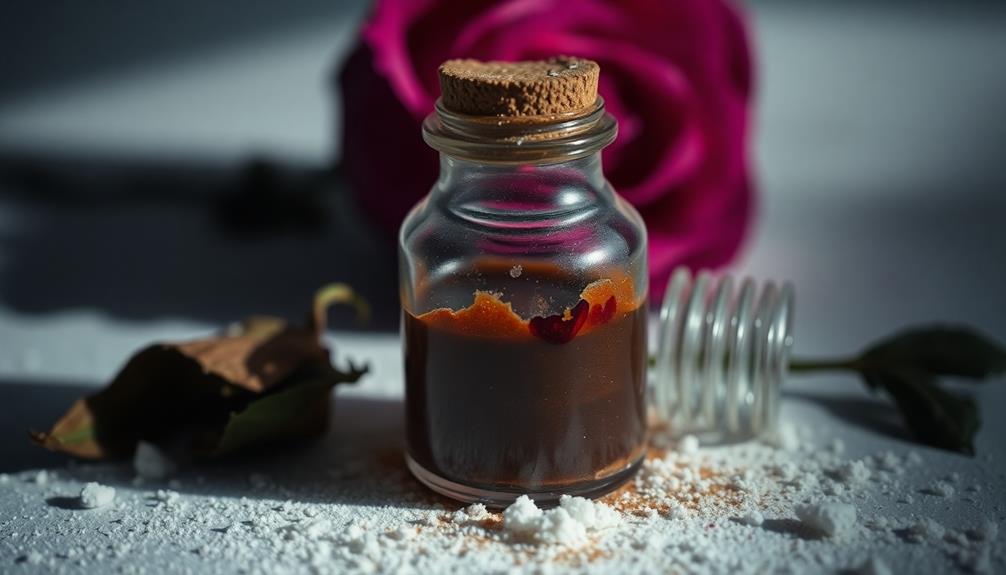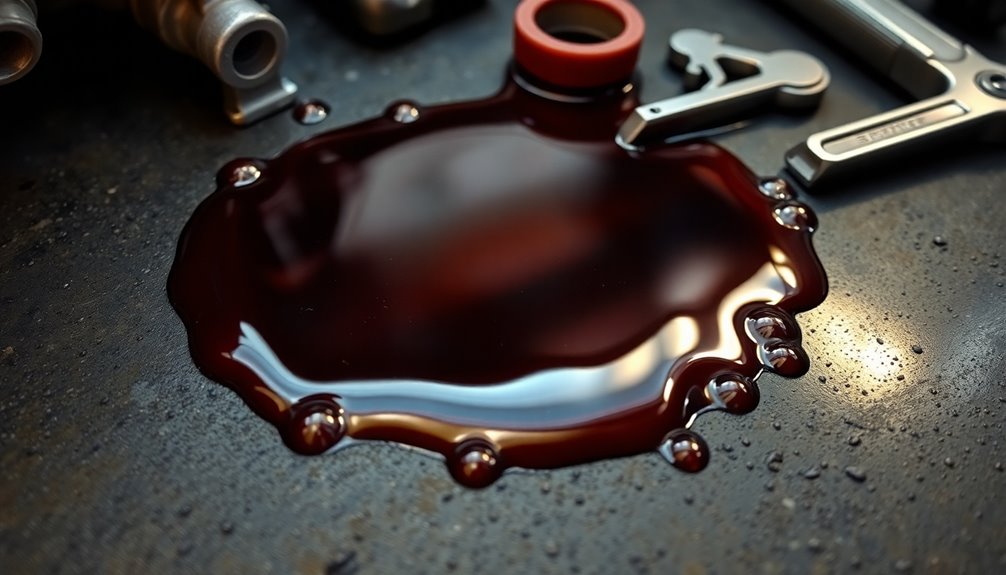Shea butter has a wonderful, nutty aroma that feels warm and inviting! Depending on how it's made, its scent can change. Unrefined shea butter often has a richer and slightly smoky smell, while refined shea butter tends to be milder and more neutral. This delightful scent comes from the nuts of the African shea tree, which can vary based on where they're grown. Fresh shea butter should smell nice, but if it has a sharp, vinegary odor, it's spoiled and should be avoided. Stick around, and you'll discover even more about the magic of shea butter!
Key Takeaways
- Fresh shea butter has a warm, inviting nutty aroma, while unrefined versions may include earthy and slightly smoky notes.
- Refined shea butter offers a milder, more neutral scent compared to the stronger fragrance of unrefined butter.
- Rancid shea butter emits a sharp, vinegary odor, indicating spoilage and should be avoided for safety.
- The aroma of shea butter can vary based on the growing region, processing methods, and storage conditions.
- Cultural associations link shea butter's scent to relaxation, nostalgia, and therapeutic benefits, enhancing its appeal in skincare and rituals.
Introduction

When you first encounter shea butter, you might notice its distinct nutty aroma, which can evoke a mix of earthy and slightly smoky notes, especially in its unrefined form. This scent is part of what makes shea butter special. The smell can be strong, and some people absolutely love it, while others might find it a bit overpowering.
If you prefer a milder scent, you can always go for refined shea butter, which often lacks a significant aroma.
Unrefined shea butter is known for its amazing benefits. It's a natural product packed with vitamins and nutrients that can do wonders for your skin and hair. The nutty scent is a sign of its purity, and if it smells rancid or off, it's best to avoid using it.
The shea butter smell can also change depending on where the shea nuts are grown and how they're processed. So, every batch might've its own unique scent! Exploring shea butter's aroma is like embarking on a delightful journey, where every whiff reveals the wonderful qualities of this incredible natural ingredient.
Description of the Smell
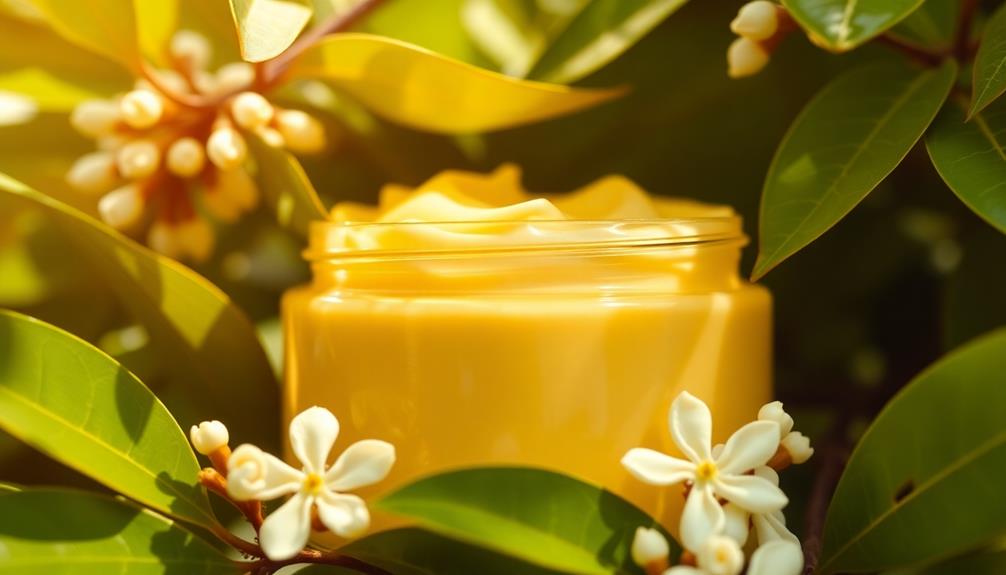
Shea butter's smell can be quite captivating, with its distinct nutty aroma often described as warm and inviting. When you open a jar of fresh shea butter, you might notice a delightful scent that makes you want to take a deep breath. This pleasant nutty scent can vary, sometimes being a strong scent depending on how the shea butter is processed.
If you're using unrefined shea butter, you might even catch a hint of smokiness, thanks to traditional methods where wood is often used as fuel. Isn't that interesting?
However, keep an eye out! If shea butter goes rancid, it emits a sharp, vinegary smell that's definitely not appealing. This unpleasant odor signals spoilage, so it's best to avoid using it.
On the other hand, refined shea butter usually has a milder scent and may lack that strong aroma. Many people prefer this neutral scent, but it mightn't have all the amazing benefits of unrefined shea butter.
Source and Composition
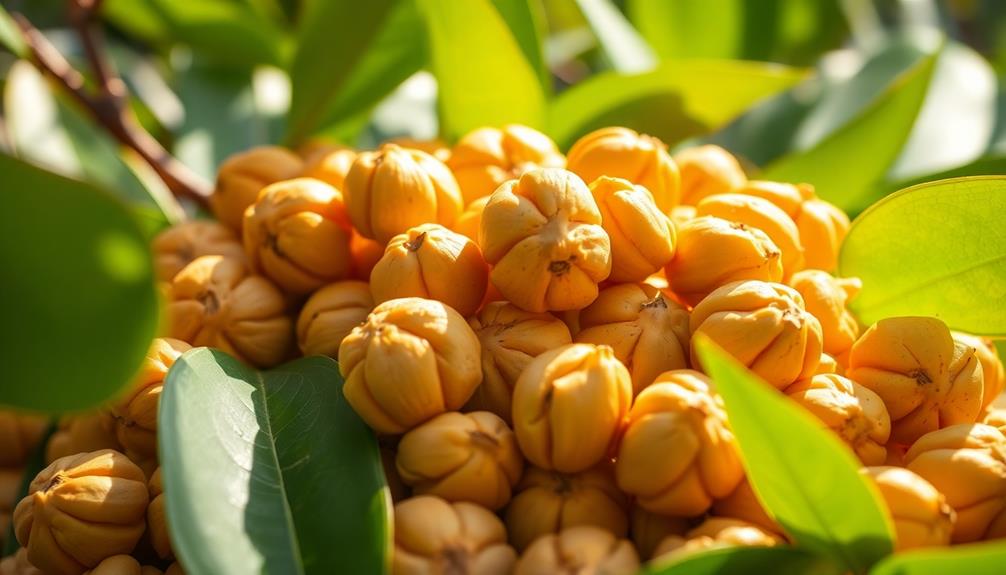
Derived from the nuts of the African shea tree, shea butter boasts a rich composition that plays a crucial role in its quality and benefits.
When you think about shea butter, consider its wonderful smell! The aroma can vary, often ranging from a mild nutty scent to a stronger, earthy fragrance. This difference comes from where the shea nuts are grown and how they're processed.
If shea nuts are roasted in traditional ways, you might notice a richer smell, making the butter even more delightful. On the other hand, refined shea butter usually doesn't have a distinct scent, which can make it feel less special.
The soil and climate of the area where the shea nuts are cultivated also affect the aroma. Fresh, unrefined shea butter has a characteristic scent that signals its quality.
If you ever catch a rancid or off smell, it's a sign that the butter has spoiled. So, whenever you pick up a jar of shea butter, take a moment to enjoy its unique aroma. It's not just a treat for your skin, but also for your senses!
Typical Scenarios or Environments
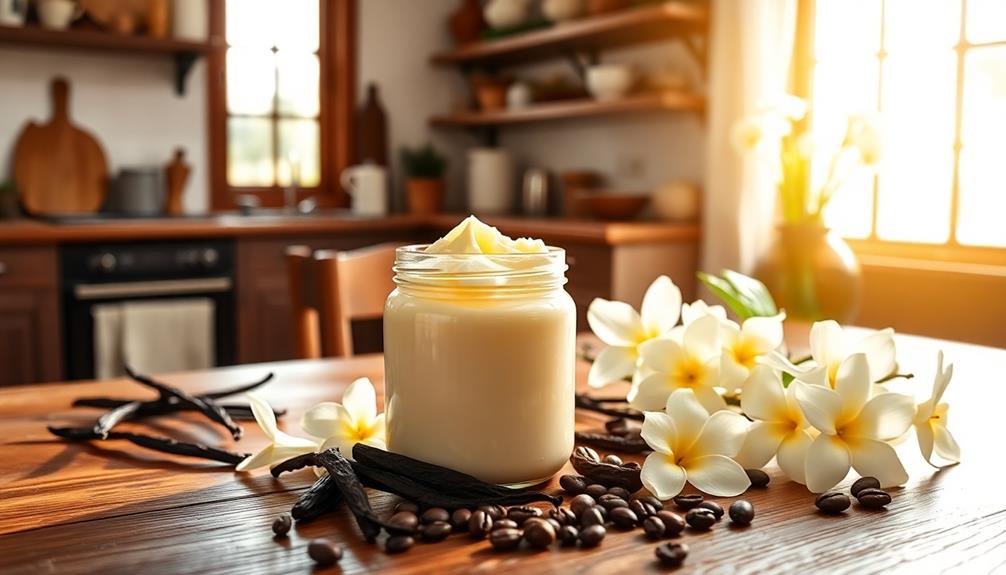
Experiencing the aroma of shea butter can vary significantly depending on the typical scenarios or environments in which it's produced and stored.
In traditional settings, where wood fires are often used during extraction, you might notice a smoky scent that lingers, adding a unique twist to the smell of shea butter. Freshly made shea butter can also surprise you with its nutty aroma, which is influenced by the local soil and climate. Additionally, the method of extraction and the care taken during production can further enhance or diminish these natural fragrances. For instance, when shea butter is mixed with essential oils, such as sandalwood, it can adopt a more complex and layered fragrance. The scent profile of sandalwood, known for its warm, woody, and slightly sweet notes, can complement the nutty aroma of shea butter, creating a deeper and more luxurious olfactory experience.
If you're in a well-ventilated area, the scent of unrefined shea butter may fade over time, resulting in a milder smell that some people prefer.
However, remember that storage conditions play a big role. If shea butter is exposed to air and light, it might develop a stronger nutty scent or even go bad, leading to rancidity.
Humidity is another factor to consider. In damp environments, moisture can cause shea butter to spoil, creating unpleasant odors.
It's best to store shea butter in a cool, dry place to maintain its delightful aroma. By being mindful of these environments, you can enjoy the full, wonderful scent of shea butter!
Emotional or Cultural Associations

Throughout history, the nutty and earthy aroma of shea butter has woven itself into the fabric of various cultures, particularly in West Africa. This delightful scent isn't just pleasant; it brings up strong emotional responses for many people. When you smell shea butter, you might feel a wave of relaxation or even a sense of nostalgia, recalling childhood moments tied to natural remedies.
In West African cultures, the natural aroma of shea butter connects family and community. It's often used in rituals, skincare, and even food, highlighting its importance in cultural heritage. The scent can remind you of gatherings with loved ones, creating a warm feeling of togetherness.
Many people see shea butter as a symbol of authenticity and purity, especially when compared to synthetic fragrances. This earthy scent can also help you feel better! Shea butter's therapeutic properties promote stress relief and improved sleep quality.
Health or Safety Considerations
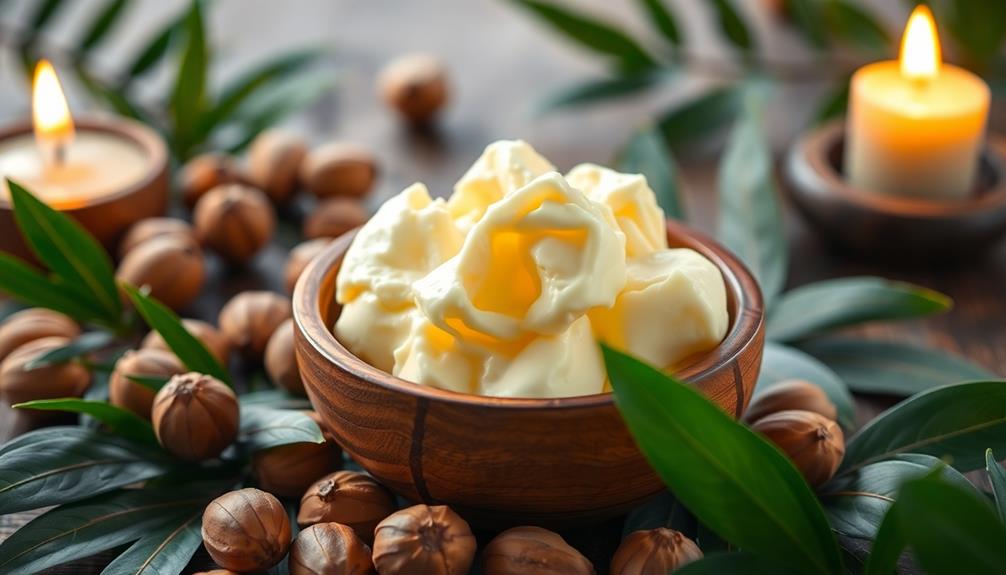
When it comes to health and safety, being aware of shea butter's condition is crucial for ensuring its benefits without risks. Fresh shea butter has a delightful nutty aroma that many people love.
However, if your shea butter starts to smell sharp or vinegary, that means it's rancid! Using rancid shea butter can cause skin irritation or other health problems, so it's best to avoid it.
To keep your shea butter fresh, proper storage is key. Store it in airtight, opaque containers and keep it in a cool place. This can help prevent spoilage and keep that wonderful scent intact.
If you're sensitive to natural scents, don't worry! You can blend shea butter with essential oils to create a fragrance that's perfect for you.
Always check your shea butter for any changes in smell, color, or texture. This way, you can enjoy its amazing benefits safely.
Final Thoughts
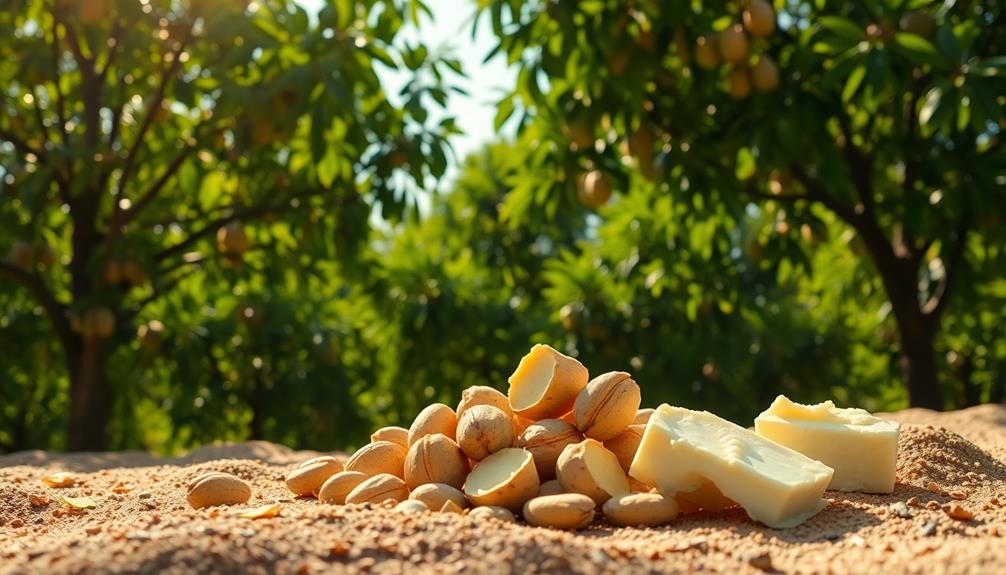
In summary, understanding the scent of shea butter is essential for appreciating its quality and benefits. Shea butter typically has a delightful nutty aroma that can vary. If you choose unrefined shea butter, you might notice a smoky scent from traditional processing methods. On the other hand, refined shea butter usually has a much milder smell, sometimes almost bland.
When you open a fresh jar, the pleasant nutty scent welcomes you. But beware! If shea butter smells sharp or vinegary, it's likely gone bad. You wouldn't want to use that!
If you want to change the smell, adding essential oils, cocoa powder, or vanilla extract can make it more appealing. This way, you can enjoy shea butter's wonderful moisturizing qualities while also creating a scent you love.
Don't forget, the aroma of shea butter also reflects its purity and offers therapeutic benefits. Its scent can help you relax and feel less stressed!
Frequently Asked Questions
Does Pure Shea Butter Smell Good?
If you're wondering whether pure shea butter smells good, it really depends on your preferences. Many find its nutty aroma pleasant, while others might feel it's too strong compared to typical scented products.
Does Shea Butter Smell Like Cocoa Butter?
No, shea butter doesn't smell like cocoa butter. You'll notice shea's nutty, earthy aroma contrasts with cocoa butter's rich, chocolate scent. Each butter has its unique fragrance, highlighting their distinct characteristics when used in products.
How to Tell if Shea Butter Is Real?
To tell if shea butter's real, check for a strong, nutty scent and consistent color. Avoid any with rancid odors or artificial hues. Sourcing from reputable producers often ensures authenticity and quality.
Is Shea Butter Supposed to Smell Smokey?
Yes, shea butter can smell smoky, especially if it's unrefined, due to traditional processing methods. If you prefer a milder scent, look for refined options, which usually lack that distinctive aroma.
